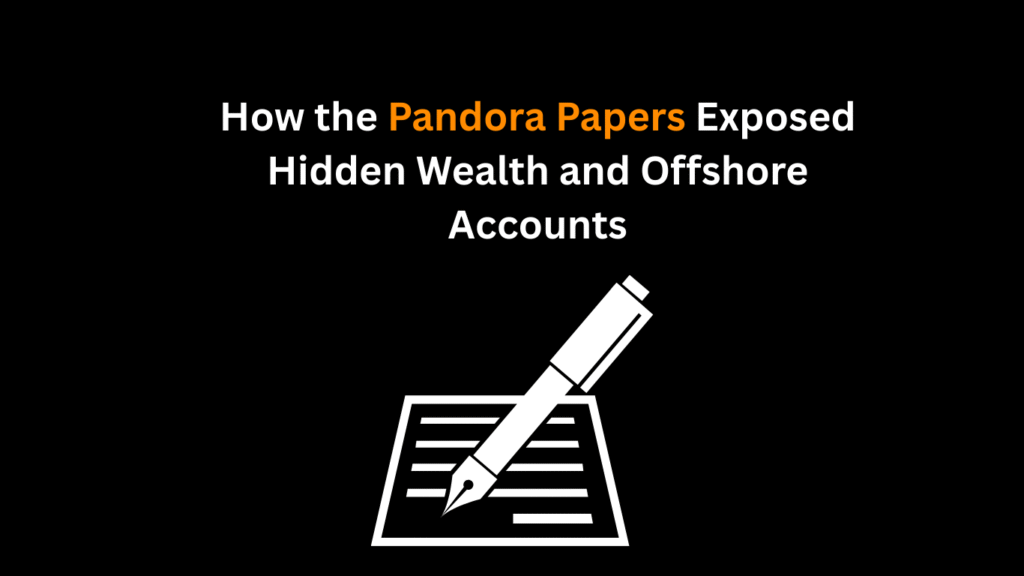The Pandora Papers can be described as one of the largest financial document leaks that rocked the world in October of 2021. This leak, organized by the International Consortium of Investigative Journalists (ICIJ), focused on how influential rich individuals, politicians as well as business people avoided paying taxes by using offshore structures to hide their resources in the offshore. The Pandora Papers leaks consisting of close to 12 million documents have topped the previous investigations; the Panama Papers, the Paradise Papers and have marked the newest chapter in the never-ending quest to increase financial transparency.
What are the Pandora papers?
Pandora Papers is a name given to a huge trove of its leaked financial files of 14 offshore service providers. These documents also disclosed information on hidden firms, trusts and other foundations that are registered in tax havens like the British Virgin Islands, Seychelles and Panama. In contrast to previous leaks in offshore, the Pandora Papers provided an unparalleled magnitude; more than 330 politicians and other people in positions of power were covered in over 90 countries.
The leak demonstrated how offshore companies are frequently employed to mask ownership of property with the assets making it tougher to trace monetary movements by regulators and authorities. Although not all off-shore doings may be illegal, the mystery that comes with them makes one wary of money laundering, tax evasion and corruption.
Who Involved in the Pandora Papers Leaks?
Presidents, prime ministers, royalty, celebrities and business people were involved in these Pandora Papers leaks. There are others who would purchase luxury properties, yachts and artwork using offshore companies. Others were also found guilty of transferring money into clandestine accounts in order to escape searchlight in the countries of their origin.
One problem that stood out concerning the leaks was the high figure of politically exposed persons (PEPs) that were involved. As PEPs are people of influence and pose greater risks of corruption therefore, the results highlighted the need to have toughened PEP check mechanisms in financial compliance programs.
Secret Accounts and Secret Money
A major disclosure by the Pandora Papers was the massive use of offshore account holdings and shell companies. These are institutions that permit people to move money across jurisdictions with minimal visibility. To illustrate, a politician could buy a London or Dubai property through an offshore trust and in effect conceal the origin of money.
Such kind of activity is challenging to regulators and financial institutions. Unless substantially monitored, offshore leaks such as the Pandora Papers show just how quickly money can be hidden in offshore jurisdictions and evade taxation and prosecution. Using tools like the mexico isr tax calculator can help ensure compliance by providing clear tax obligations when managing offshore assets.
The International Leaks Database Role
Response to global leaks Some of the tools created by organizations such as the ICIJ in response to global leaks include International Leaks Database. This is a publicly available searchable database of leaked offshore data where journalists, researchers and compliance experts can search it. Institutions can enhance due diligence, by cross-referencing names and entities to better counter inflow of dirty money.
Regarding companies, incorporating resources such as the International Leaks Database in compliance processes can increase the capacity to determine the customers and entities at the greatest risk. It is coupled with the automated PEP check solutions, thus offering a better guard against unknowingly transacting with people who have been (or might get) involved in illegal money endeavour.
Why Pandora Papers are of Value in Compliance
The Pandora Papers are not merely a scandal: they amount to a wake-up call to the financial sector. The leaks exposed shortcomings in regulatory control and highlighted the need to have strong anti-money laundering (AML) procedures.
In the case of financial institutions, such prevention involves effective transaction monitoring, extensive KYC (Know Your Customer) processes, with particular focus on high- risk customers. Sanctions list screening, adverse media screening and PEP screening can no longer be optional, but form the essence of compliance on a global scale.
In addition, the concern on transparency in beneficial ownership has led to keen interest by regulators in most parts of the world. It is complicated to have heterogeneous offshore structures protecting the crimes by hiding the real perpetrators because in most jurisdictions, firms must report their ultimate beneficial owners (UBOs).
What To Learn With the Pandora Papers
The leaks of the Pandora Papers highlights some key lessons:
- There should also be a level of transparency: jurisdictions should only require beneficial ownership disclosure.
- Enforcements have to change: the traditional means are simple checks which are of no use in a world where offshore structures are advanced.
- Cross-border cooperation is needed: transnational financial crimes like the one discussed in this case reveal that this kind of transnational crime needs transnational cooperation.
Using state-of-the-art screening tools, utilizing the International Leaks Database and improving PEP check procedures, financial institutions can improve their line of defense against money laundering and corruption threats.
Read More: Can Sports Apps Replace a Trainer?
Conclusion
The Pandora Papers were able to expose the manner in which wealth is hidden and concealed through offshore structures and other hidden accounts to avoid taxes and in some cases, criminal behavior. Even more important, the leaks shed the light on the necessity of more transparency and stricter compliance systems. Coupled with the enabling of tools such as International Leaks Database and streamlined PEP checks, profiling, business and regulators have more chance of identifying and preventing financial crime.
Amid a growing level of scrutiny around illicit finance globally, the Pandora Papers are another reminder that secrecy taken to extremes is expensive. At the level of institutions, the consideration of compliance practices in the context of such offshore leaks goes beyond deterring imposed penalties but rather ensuring standard practices of trust, integrity, and accountability in the world economy.




